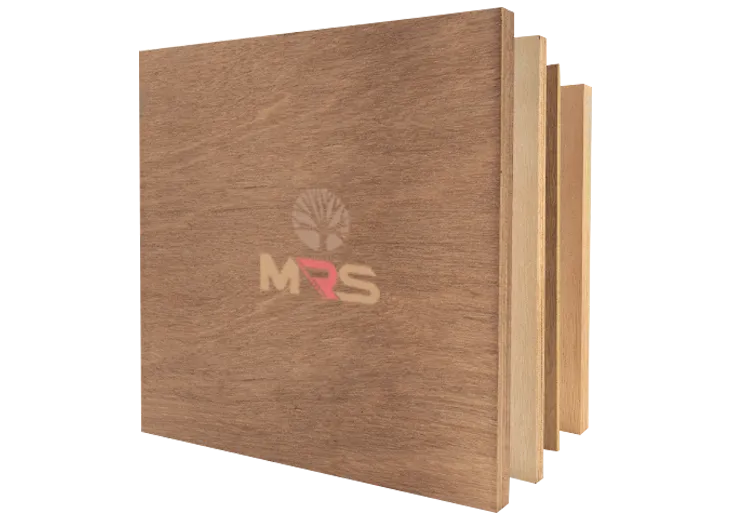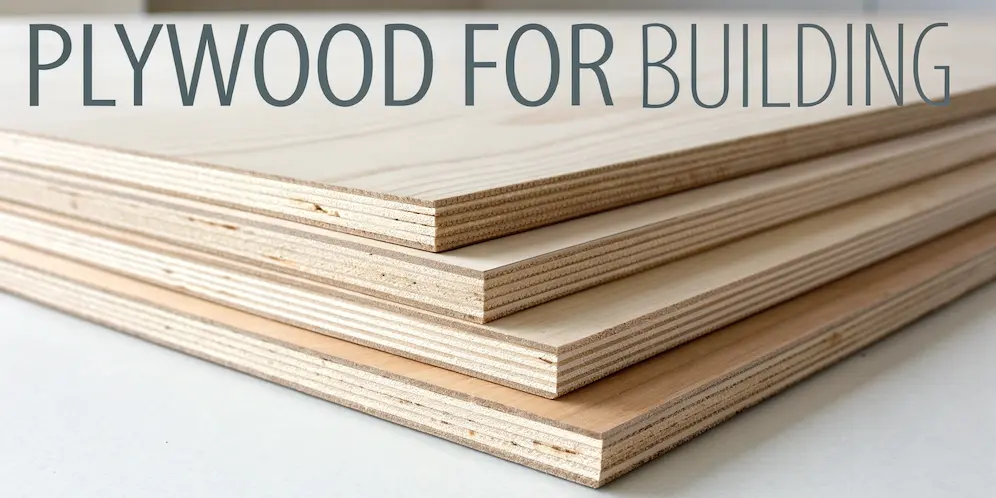Every year, the construction industry experiences a growing demand for new building materials, as researchers and experts strive to find alternatives to traditional options that address common challenges. Due to the properties of plywood, such as its strength, flexibility, and durability, it has emerged as a highly desirable material, revolutionizing the wood industry with its many advantages.
Today, plywood is in high demand for construction projects, surpassing traditional materials such as natural wood, bricks, and plastic. MRS Plywood, one of the best manufacturers, offers an ideal combination of lightness, strength, and flexibility, which are key properties of plywood, making it an excellent choice for various applications.
As one of the leading plywood producers and plywood sheet manufacturers in the market, MRS Plywood maintains the highest quality standards to ensure that its products are reliable and durable.
As a result, the global plywood market, driven by innovative plyboard factories like MRS Plywood, continues to grow at an impressive rate.
What is Plywood?
Plywood is a type of engineered wood created by stacking several layers of thin wood veneers. Unlike natural wood, properties of plywood are easily accessible in all regions and are often more cost-effective. This has led to its increased use in the construction industry over the past few decades, as well as in interior design solutions.
Plywood is now a popular building material worldwide due to its numerous benefits and characteristics of plywood, such as strength, flexibility, and resistance to cracking, shrinking, or warping. Soft, hard, tropical, and decorative plywood are now produced by many companies, each serving different purposes. Plywood is used for everything from furniture to constructing the structural framework of a building, making doors and windows, building drywall and partition walls, and creating decorative items.
Despite the availability of other composite sheets and panels in the market, plywood remains a preferred choice for experts and woodworkers because of its inherent properties such as strength and stability, ease of working, and affordability. The advantages of plywood include its lightweight nature, versatility for various applications, and resistance to moisture and insects. These qualities make plywood an ideal material for furniture making, cabinetry, and construction, allowing for both functionality and aesthetic appeal.
What Are The Properties of Plywood?
The properties of plywood, such as its strength, flexibility, and resistance to cracking, make it a popular choice for a variety of construction projects. Below are some of the key features that contribute to its versatility as a building material
1. High Strength and Dimensional Stability
The structural strength of plywood comes from the timber used in its manufacturing process, in addition to the properties it gains from its laminated construction. The cross-graining technique involves gluing thin plies of wood together at a right angle, which enhances the plywood’s resistance to splitting while providing consistent strength and stability.
Unlike natural wood, high-quality plywood does not change in size due to fluctuations in moisture content or humidity, meaning it does not expand or contract. This characteristic is the primary advantage of plywood over other materials.
Uses:- Plywood is a cost-effective option for structural applications, including flooring, walls, partitions, formwork, cupboards, shelves, and more, due to its excellent strength and stability.
2. High Impact Resistance
The cross-lamination of plywood panels gives it a high tensile strength by spreading force over a larger area, which reduces tensile stress. This allows plywood to withstand overloading up to twice its designated load.
Uses:- Plywood’s high tensile strength is particularly advantageous for flooring and concrete formwork applications. It is well-suited for use in various buildings, including industries with heavy wear, as a result of its durability.
3. Panel Shear or Braced Panels Shear
Veneer manufacturing plays a crucial role in enhancing the bondability of wood veneer surfaces through chemical treatment. As a result, plywood panels made from treated veneers exhibit higher shear strength compared to those made from non-treated veneers.
By treating veneers, the shear strength of plywood increases to nearly twice that of solid wood, making it an ideal choice for use in wooden structures as bracing for resisting lateral loads.
Uses:-Plywood’s excellent strength and stability make it ideal for use as gussets in portal frames, as well as bracing panels and webs in fabricated wooden beams.
4. Water and Chemical Resistance
During the manufacturing process of thin plies, a substance is used to treat the veneers which makes plywood highly resistant to water and chemicals. However, it should be noted that plywood has lower water and chemical resistance compared to natural wood.
Uses:-
- Plywood’s resistance to water and chemicals makes it a popular choice in chemical industries.
- To enhance its water and chemical resistance, plywood is treated with waterproof glue and other chemicals, resulting in Marine plywood.
- This property makes plywood suitable for various outdoor projects such as garden furniture, decking, porches, and planters, as well as indoor furniture and concrete formwork.
- However, not all types of plywood are water-resistant, and appropriate grades should be used accordingly.
5. Flexibility or Bendability
Plywood stands out from natural wood due to its flexibility or bending ability. Certain types of plywood can be bent easily without breaking or suffering any damage. Plywood can be produced to match every requirement, unlike wood.
Additionally, the thickness of plywood can vary from a few millimeters to inches. The number of veneers used in plywood production can range from three to several, increasing the thickness of the plywood sheet. More layers of veneer contribute to greater strength in plywood, while fewer veneers or specifically treated veneers make plywood more flexible or bendable.
Uses:-
- Plywood’s ability to flex and bend without breaking or cracking sets it apart from natural wood. This flexibility makes it a preferred material for furniture with curved surfaces.
- Plywood’s range of thickness also makes it suitable for various applications such as ceilings, curved formwork, and paneling work.
- In addition to structural uses, plywood’s versatility and flexibility make it an ideal choice for manufacturing decorative items and furniture.
6. Fire Resistance
MRS Plywood has the ability to be treated with a fire-resistant chemical coating, which can be combined with non-combustible materials like fibrous cement or plasterboard. The coating on the plywood can resist oxidation, hence decreasing the rate at which fire can spread.
Uses:- This characteristic makes plywood appropriate for application in structures that require fire resistance.
7. Sound and Thermal Insulation
During the production of plywood, thin plies or veneers are bonded together with resin adhesives. This makes it an effective insulator against both heat and sound. Plywood’s insulation properties help in reducing heating and cooling expenses significantly.
Uses:- MRS plywood is in high demand for ceilings, flooring, roofing, and wall cladding work in Western countries where there is a requirement for high heat resistance.

Benefits of Using Plywood Over Other Natural Woods
Plywood offers several advantages over solid wood, including cost-effectiveness, stability, and resistance to warping. Below are the key benefits that make plywood a preferred option for various construction and furniture projects
1. Ease of Use:
- Joint-free Construction: Plywood is available in various standard shapes and sizes, making it easier to use without the need for creating joints. Among the plywood advantages are its durability, resistance to warping, and its versatile applications in construction and furniture, ensuring both strength and ease of installation.
- Large Widths: It allows for large-width wooden members like doors or partitions, which is challenging with natural wood.
2. Moisture Resistance:
- Less Susceptible to Moisture: Plywood is not as susceptible to moisture damage as natural wood.
- Stable in Humidity: It performs well under different temperatures and humidity levels, avoiding expansion or contraction issues.
3. Versatility in Thickness:
- No Limitations in Thickness: Unlike natural wood, plywood can be produced in larger thicknesses, providing a joint-less surface with a larger area.
4. Cost-effectiveness:
- Economical Sizes: Plywood sheets can be up to 8 feet in length, offering a more cost-effective option compared to natural wood.
- Less Skilled Labor: Using plywood requires less skilled labour compared to natural wood.
5. Aesthetic and Finish:
- Polish and Paint: Plywood can be effortlessly polished or painted to achieve the desired finish, enhancing its visual appeal for various applications.
- Versatility in Design: Plywood can be easily cut and shaped into intricate designs, making it suitable for custom furniture and decorative elements.
- Consistency in Appearance: Unlike natural wood, plywood offers a consistent grain and texture, ensuring uniformity in large projects.
6. Durability:
- Lifespan: MRS plywood can have a lifespan of up to 10 years or even longer.
- Quality Considerations: While plywood is durable, its quality may be compromised if it comes into contact with moisture or termites, unlike natural wood which typically has a longer lifespan.
Conclusion
The properties of plywood—including its strength, flexibility, resistance to moisture, and cost-effectiveness—make it a versatile material for construction projects. Its stability and ability to resist warping, cracking, and shrinking make it a more reliable option than solid wood, particularly in environments with fluctuating temperatures or humidity.
Overall, plywood’s benefits are revolutionizing the building industry, providing a sustainable and practical alternative to traditional materials.
Frequently Asked Questions (FAQs)
Plywood has become a popular choice in the construction industry due to its versatility, strength, and cost-effectiveness. Below are common questions about the properties of plywood and how it benefits various building projects.
What Are The Main Properties Of Plywood That Make It Ideal For Construction?
The main properties of plywood include its high strength, dimensional stability, flexibility, and resistance to moisture, making it suitable for a wide range of building applications.
Why Is Plywood Preferred Over Solid Wood In Many Construction Projects?
Plywood is preferred for its resistance to warping and cracking, as well as its affordability. It also offers greater flexibility in terms of thickness and size, making it easier to work with in various applications.
Can Plywood Be Used In Outdoor Construction?
Yes, specific types of plywood, such as marine plywood, are designed to resist moisture and can be used for outdoor construction where durability in wet conditions is essential.
How Does The Strength Of Plywood Compare To Natural Wood?
Plywood’s cross-grain structure provides added strength and stability compared to natural wood, which can be prone to splitting and warping over time.

